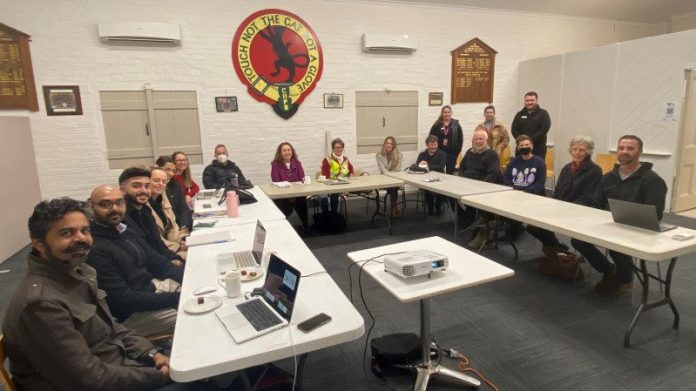
Mount Alexander Shire Council and the Country Fire Authority (CFA) hosted a workshop with key stakeholders from the Chewton community and RMIT and CSIRO researchers to discuss Evacuation Mapping for the region last week.
The round table discussion at the Castlemaine Botanical Gardens Tea Rooms was part of a broad ‘Community Based Bushfire Management’ program that the CFA are initiating in Chewton with a focus on enhancing disaster resilience.
This is a community-led, place-based approach to risk reduction that is part of the Victorian Government’s Safer Together program.
The workshop looked at an evacuation scenario in the township in the event of a bushfire on a day of extreme weather, what traffic would do and how the community would respond.
The modelling is being led by RMIT principal research fellow Dr Dhirendra Singh and Dr Erica Kuligowski an expert on modelling human behaviour in mass evacuation events.
Dr Singh said the workshop looked at a very specific scenario being an extremely hot Friday afternoon in February, where there were children in attendance at Chewton Primary, families at the local pool and lots of visitors at the popular swimming spot at Expedition Pass Reservoir. This scenario was co-designed with community input and local knowledge.
“We discussed what would happen if there was a fire in the landscape, how weather conditions would impact this and how traffic would respond in an emergency. We also looked at what would happen if a tree came down or there was an accident on one of the main roads and how this might impact the evacuation of the township,” Dr Singh said.
The RMIT and CSIRO team will now go away and collate all the data to create a computer model of the scenario and workshop participants will reconvene in two to three months to look at exactly what would happen in such an emergency, and how the community and emergency services can best prepare for such incidents.
Mount Alexander Shire Council’s emergency coordinator Luke Ryan said the modelling can be quite confronting but was crucial to provide an understanding of what can occur during such an emergency and the best way the community can be prepared.
Mr Ryan said the Victoria Police are the lead agency when it comes to evacuation and traffic management and they have tested the data around this but it is not current.
“We will also be seeking input from those unable to attend to create a new Traffic Management Plan. The modelling will help us to establish what went right and what went wrong and to fill those gaps and build resilience,” he said.
CFA Community Based Bushfire Management Facilitator Claire Collie thanked all the community stakeholders which took time to be part of the discussion and offered valuable knowledge and input on the area, including representatives from Mount Alexander Shire Council Luke Ryan and emergency management officer Zack Abbott, Cr Christine Henderson, members of the CFA, Chewton Primary, Dhelkaya Health, volunteers from the local Red Cross, the Chewton Pool committee, and the wider community.
“We thank everyone for their input and look forward to exploring the modelling and planning for future response and increased preparedness of the Chewton community,” Ms Collie said.
Anyone who would like to be involved in the Chewton CBBM project can email Claire for more information at Claire.Collie@cfa.vic.gov.au

